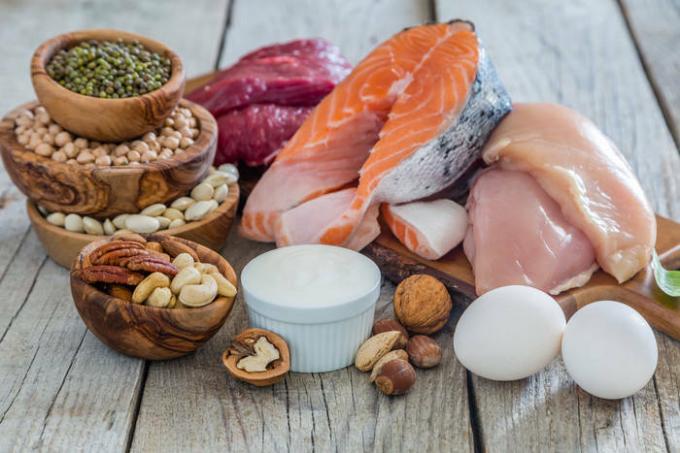Why does a child need fish oil, what criteria should be used to choose this supplement, at what age and in what dosages do you need to introduce Omega-3 into the children's diet?
Why does a child need fish oil
Fish oil is one of the essential supplements for a child. Its uniqueness is primarily due to the presence of specific fatty acids (Omega-3). This group includes ALA (alpha-linolenic acid), EPA (eicosapentaenoic acid) and DHA (docosahexoic acid). These acids are almost not produced in our body, so they must come to us in food. At the same time, it has been proven that the daily intake of Omega-3 with food is received only by those people who have oily seafood
a fish - the basis of the daily diet.
Getting the right amount of Omega-3 from food is very difficult / istockphoto.com
All other people suffer from omega-3 deficiency to one degree or another. But if adults can live with this deficiency for quite a long time, then children need polyunsaturated fatty acids for growth and proper development. Investigating the effect of omega-3s on the body, scientists have come to the conclusion that they perform a number of important functions:
- improve metabolic processes of the body, promoting active growth and development of cells
- increase the body's ability to regenerate, accelerate tissue repair processes
- promote the absorption of calcium by the body, maintain bone mineral density
- stimulate the development of the brain, strengthen neural connections, increase concentration of attention
- strengthen the immune system, contribute to the formation of the correct immune response to pathogens of viral, infectious and allergic diseases
- normalize blood cholesterol levels, preventing obesity and the risk of developing cardiovascular diseases
- stimulate the synthesis of serotonin (the hormone of happiness), helping the body to cope faster with fatigue, stress and increased mental stress

Fish oil helps with mental stress and poor concentration / istockphoto.com
Therefore, the prophylactic intake of fish oil is recommended for absolutely all children, with the exception, perhaps, of infants. In some cases, doctors prescribe the intake of this dietary supplement for children without fail. Omega-3 helps to correct the following problems:
- absent-mindedness, difficulty remembering
- attention deficit, irritability, hyperactivity
- susceptibility to ARVI, to which bacterial complications are often connected
- vision problems (dry eyes, fatigue and inflammation)
- dental problems (decay of milk teeth or multiple permanent caries)
- obesity due to stress or hormonal imbalance
- anemia
- sleep disturbances
Fish Oil and Omega-3: What's the Difference
Today in pharmacies you can buy both fish oil in capsules and vitamins with omega-3 content. The difference between these supplements is about the same as between meat and pure protein. Fish oil is a product from the carcass or liver of fish, rich in vitamins A, E, D and polyunsaturated fatty acids. Omega-3s are the fatty acids themselves, obtained by filtering fish oil.
What to choose for a child is up to you. On the one hand, omega-3 supplements provide the body with higher concentrations of fatty acids than natural fish oil. The product is cleared of ballast substances, gets rid of a specific smell and taste. On the other hand, fish oil contains additional trace elements that have not bothered anyone yet. In addition, this dietary supplement is much cheaper than Omega-3 and is sold in almost every pharmacy.

Choose fish oil from Norwegian fish carcasses / istockphoto.com
If you decide to give your child natural fish oil, experts recommend choosing a product from the carcasses of fish from the northern seas (Norwegian salmon, mackerel, cod, halibut). At the same time, choose fat that is obtained from carcasses, and not from fish liver. Despite the fact that the liver contains more Omega-3, toxic substances often accumulate in it, which are difficult to remove even with careful filtration. In addition, in addition to Omega-3, cod liver also contains Omega-6 acids. This type of acids cannot be used for a long time for children of preschool and school age.
At what age can you give fish oil to a child
As a rule, babies do not need fish oil. If the baby is breastfed and the mother is consuming enough Omega-3 (with food or vitamins), the child's body takes its dose of these microelements from milk mother. If the baby eats mixtures from the first days, he has constant muscle hypertonicity, there is a threat of development rickets or vitamin D deficiency, your doctor may prescribe fish oil in the form of a special liquid supplement for age. It is extremely undesirable to give this dietary supplement to an infant on its own - it often causes allergies in babies.

Fish oil can cause allergic reactions in infants / istockphoto.com
From the second year of a child's life, you can begin prophylactic intake of fish oil. At the same time, it is better for children under four years old to give the drug in liquid form. At an older age, you can switch to capsules, they are more convenient to use, easily and quickly swallowed. It is best to choose capsules in a gelatinous shell made from the bone tissue of fish that went into the production of fat. At the same time, doctors do not advise to follow the lead of advertising and buy chewable tablets with various flavors. The priority should be the quality of the product itself, not the raspberry flavor or bear-like shape.
How to choose the right fish oil dosage for your baby
When choosing fish oil, focus on the dosage of Omega-3 in one capsule or serving of the drug. Typically, manufacturers write the amount of DHA (docosahexoic acid) in combination with EPA (eicosapentaenoic acid). In the English-language abbreviation, this is referred to as DHA + EPA. There is a required minimum established by the WHO, which is adjusted depending on the weight of the child.
Omega-3 for children from 1 to 1.5 years
5-9 kg: 150-250 mg DHA + EPA
10-15 kg: 300-400 mg DHA + EPA
Omega 3 for a child 2-4 years old
10-14 kg: 300-400 mg DHA + EPA
15-20 kg: 450-550 mg DHA + EPA
Omega-3 for children 5-7 years old
up to 19 kg: 600 mg DHA + EPA
20-30 kg: 650-900 mg DHA + EPA

Children are best served with fish oil during breakfast / istockphoto.com
Having chosen fish oil, do not forget about the rules for its use. This drug should be given to a child in the morning and always with food (preferably at breakfast), since fatty acids are best absorbed with food. The capsule must be taken with a cold liquid (water, compote, juice). Liquid fish oil is given in pure form from a measuring spoon, or added to a small portion of porridge or soup. The course of taking fish oil is usually 1-1.5 months, but preparations with Omega-3 can be drunk all year round on an ongoing basis (after prior consultation with a doctor).
You will also be interested in reading:
Why fish oil is good for a child: 5 main reasons
Where to look for beneficial omega-3 acids?
The main mistakes in taking vitamins that everyone makes




